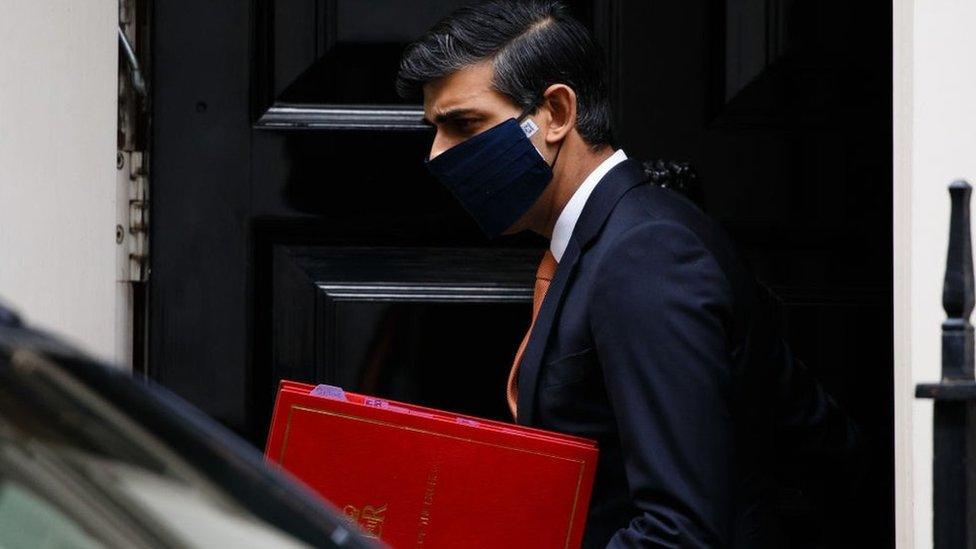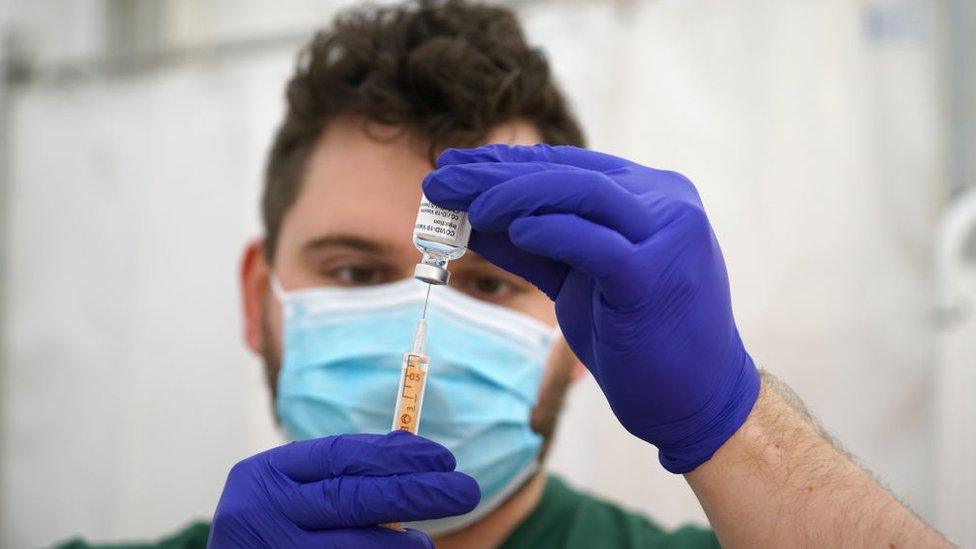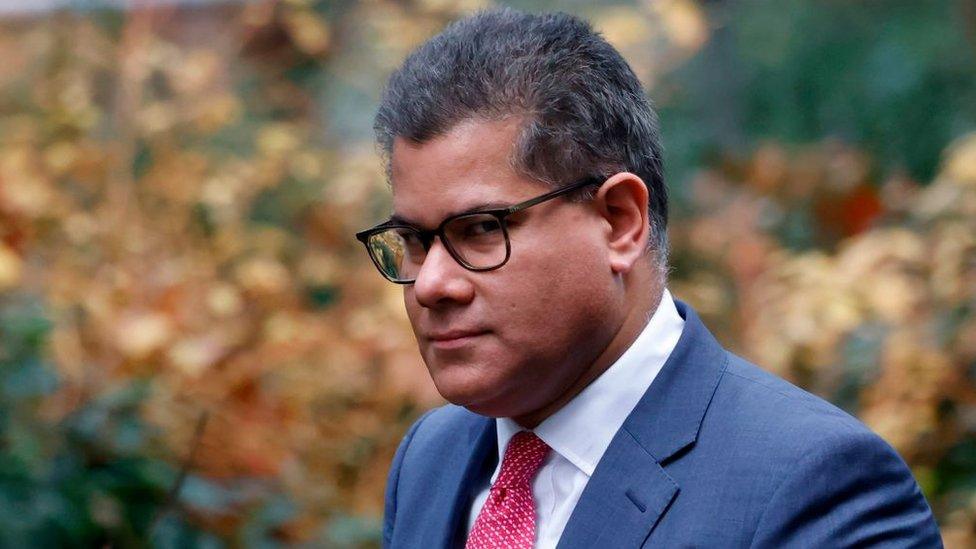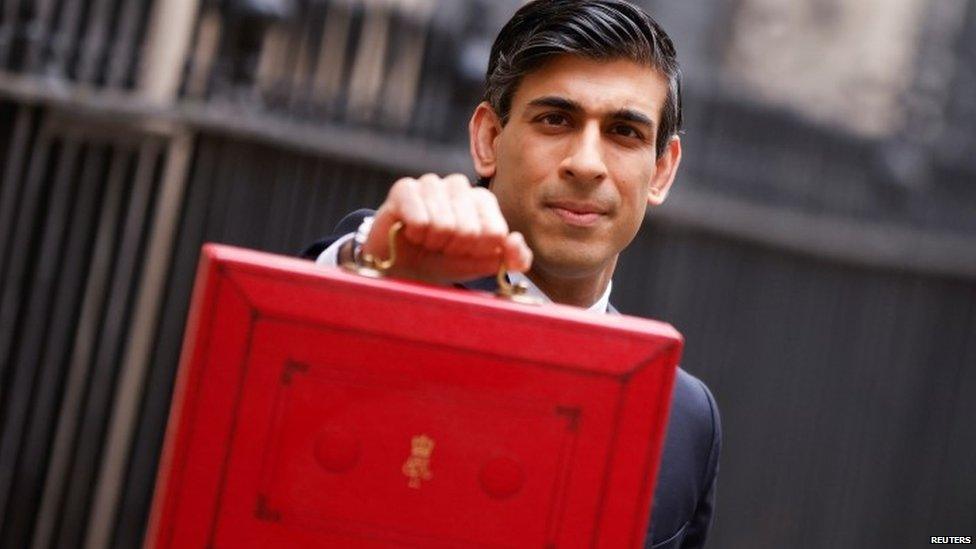Budget 2021: Will vaccine rollout be the blueprint for recovery?
- Published

It's going to be an historic Budget because of the numbers. But between the fiscal fireworks and the extension of rescue packages, Chancellor Rishi Sunak was always going to have to point the country towards a changed economy.
Post-pandemic, post-Brexit and ahead of significant "net zero" decarbonisation challenges, the plumbing of the economy is about to change.
The vaccine progress will obviously impact the timing, and perhaps the speed, of recovery from crisis.
But I'm also told that the chancellor will make the argument at the Budget that the successful rollout of the Oxford-AstraZeneca coronavirus vaccine in the UK represents a model for transforming these profound medium-term changes in the economy into sustained recovery.
It might be called the "OxAz model" of high science, big business, public participation, significant state funding and rapid regulation.
Appearing alongside the head of the Oxford vaccine team at one of his pre-Budget events, the chancellor said: "Our regulatory system has proved to be more agile and nimble and much better joined-up, than others, perhaps around the world."
He described the public-private partnership between government and AstraZeneca as a "success".
Prof Sarah Gilbert, who designed the Oxford vaccine, suggested that the past year had disproved misconceptions that vaccine research was the preserve of Big Pharma: "There's an awful lot of research that goes on in universities and in small companies.
"And we've seen some really creative partnerships really helping to move things forward."
It's well known that the government poured money into various vaccine research programmes, funding them through early stage trials and even enabling the charter of private jets to help trials, at one point.

An NHS pharmacist preparing doses of the AstraZeneca Covid vaccine in Wadebridge
A potential deal between Oxford University and a US drug-maker was blocked in favour of the UK's AstraZeneca, until then not a big player in vaccines.
Trials took advantage of the integrated network of controlled testing available across NHS hospitals.
Regulators pushed the system to allow for the same intensity of scientific trials - but in an extremely compressed timeframe.
State-funded innovations
We have seen the end product of publicly-funded science, state-brokered commercialisation, big business partnership, and the logistical efforts of the NHS and volunteers working together. Are there lessons for electric car batteries, financial technology, or even new forms of food?
The argument has already been deployed in favour of the new Advanced Research and Innovation Agency, modelled on the US defence agency Darpa, which had a role well before the pandemic in funding the first mRNA vaccines that paved the way for the Pfizer vaccine.
In announcing that, the government said it would have a "much higher tolerance for failure than normal", because the "freedom to fail is often also the freedom to succeed".

Alok Sharma's Department for Business, Energy and Industrial Strategy (BEIS) justified £11.7bn spending on vaccines
Indeed such thinking may have been present throughout the last year's rolling responses to the pandemic crisis from sourcing ventilators, and protective equipment to the test and trace system and testing technologies. The success in vaccines was pre-dated by a more mixed picture in other parts of the pandemic response.
Will the government be throwing equivalent sums of money at other forms of economic innovation, as it did for vaccines?
It was a risk given that no human coronavirus vaccine had ever been approved, let alone within one year.
But as the National Audit Office has reported, the initial £11.7bn spent upfront on vaccines was justified using a cost-benefit analysis by Alok Sharma's Department for Business, Energy and Industrial Strategy (BEIS).
BEIS said the money spent would bring estimated potential benefits of between "£11bn and £231bn, excluding wider health and social benefits".
The vaccine stands on its own on that score. But as well as saving lives and helping reopen the economy, the shot in the arm could have a far longer-lasting economic effect.
- Published24 February 2021

- Published26 October 2021

